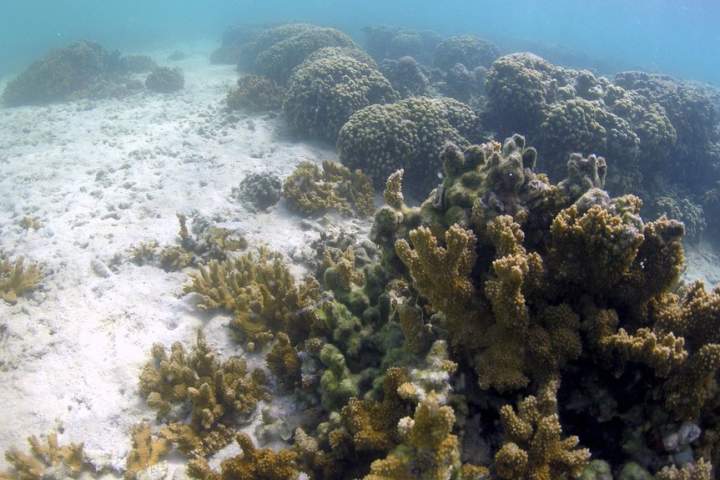Science
Coral Reefs Face Irreversible Decline as Global Warming Escalates

Global warming has reached critical thresholds faster than anticipated, leading to an almost irreversible decline of the world’s coral reefs. This alarming development was highlighted in the Global Tipping Points report, released on October 30, 2023, by a coalition of 160 researchers from around the globe. The report describes this moment as the first “tipping point” in the collapse of climate-driven ecosystems.
The findings arrive just weeks before the COP30 climate summit, scheduled to take place near the Amazon rainforest in Brazil. This vital ecosystem faces a similar risk of collapse if average global temperatures rise beyond 1.5 degrees Celsius, largely due to ongoing deforestation. The report emphasizes that the threshold for the Amazon’s stability has now been revised downward, increasing concerns about the region’s future.
Another significant issue raised is the potential disruption of the Atlantic Meridional Overturning Circulation (AMOC), a critical ocean current that moderates winter temperatures in northern Europe. “Change is happening fast now, tragically, in parts of the climate and the biosphere,” stated Tim Lenton, an environmental scientist at the University of Exeter and the report’s lead author.
Urgent Call for Action at COP30
Despite the dire warnings, Lenton pointed out some positive developments in the fight against climate change. For the first time, renewable energy sources accounted for more electricity generation than coal this year, according to data from the nonprofit think tank Ember. “Nobody wants to be just traumatized and disempowered,” Lenton remarked. “We still have some agency.”
The scientists urged countries to focus on reducing climate-warming carbon emissions during the upcoming COP30 summit. They expressed surprise at the rapid pace of environmental changes, noting that average global temperatures have already increased by approximately 1.3 to 1.4 degrees Celsius above preindustrial levels, based on data from both the United Nations and European Union science agencies.
Impacts on Coral Reefs and Marine Life
The past two years have recorded the highest temperatures on Earth, leading to marine heatwaves that have stressed 84 percent of the world’s coral reefs, resulting in widespread bleaching and even mortality. Coral reefs are crucial to marine ecosystems, supporting about a quarter of all marine life. For corals to have a chance to recover, scientists suggest that global climate action must drastically reduce temperatures to just 1 degree Celsius above the preindustrial average.
“The new report makes clear that each year there is an increase in the scope and magnitude of the negative impacts of climate change,” explained Pep Canadell, a senior scientist at CSIRO Climate Science Centre. Currently, the world is on track for approximately 3.1 degrees Celsius of warming this century if national policies remain unchanged.
As the urgency of the climate crisis escalates, the forthcoming COP30 summit will serve as a critical platform for nations to address these pressing environmental challenges and work towards sustainable solutions.
-

 Politics4 weeks ago
Politics4 weeks agoSecwepemc First Nation Seeks Aboriginal Title Over Kamloops Area
-

 World5 months ago
World5 months agoScientists Unearth Ancient Antarctic Ice to Unlock Climate Secrets
-

 Entertainment5 months ago
Entertainment5 months agoTrump and McCormick to Announce $70 Billion Energy Investments
-

 Science5 months ago
Science5 months agoFour Astronauts Return to Earth After International Space Station Mission
-

 Lifestyle5 months ago
Lifestyle5 months agoTransLink Launches Food Truck Program to Boost Revenue in Vancouver
-

 Technology3 months ago
Technology3 months agoApple Notes Enhances Functionality with Markdown Support in macOS 26
-

 Lifestyle3 months ago
Lifestyle3 months agoManitoba’s Burger Champion Shines Again Amid Dining Innovations
-

 Top Stories2 months ago
Top Stories2 months agoUrgent Update: Fatal Crash on Highway 99 Claims Life of Pitt Meadows Man
-

 Politics4 months ago
Politics4 months agoUkrainian Tennis Star Elina Svitolina Faces Death Threats Online
-

 Sports5 months ago
Sports5 months agoSearch Underway for Missing Hunter Amid Hokkaido Bear Emergency
-

 Politics5 months ago
Politics5 months agoCarney Engages First Nations Leaders at Development Law Summit
-

 Technology5 months ago
Technology5 months agoFrosthaven Launches Early Access on July 31, 2025




















